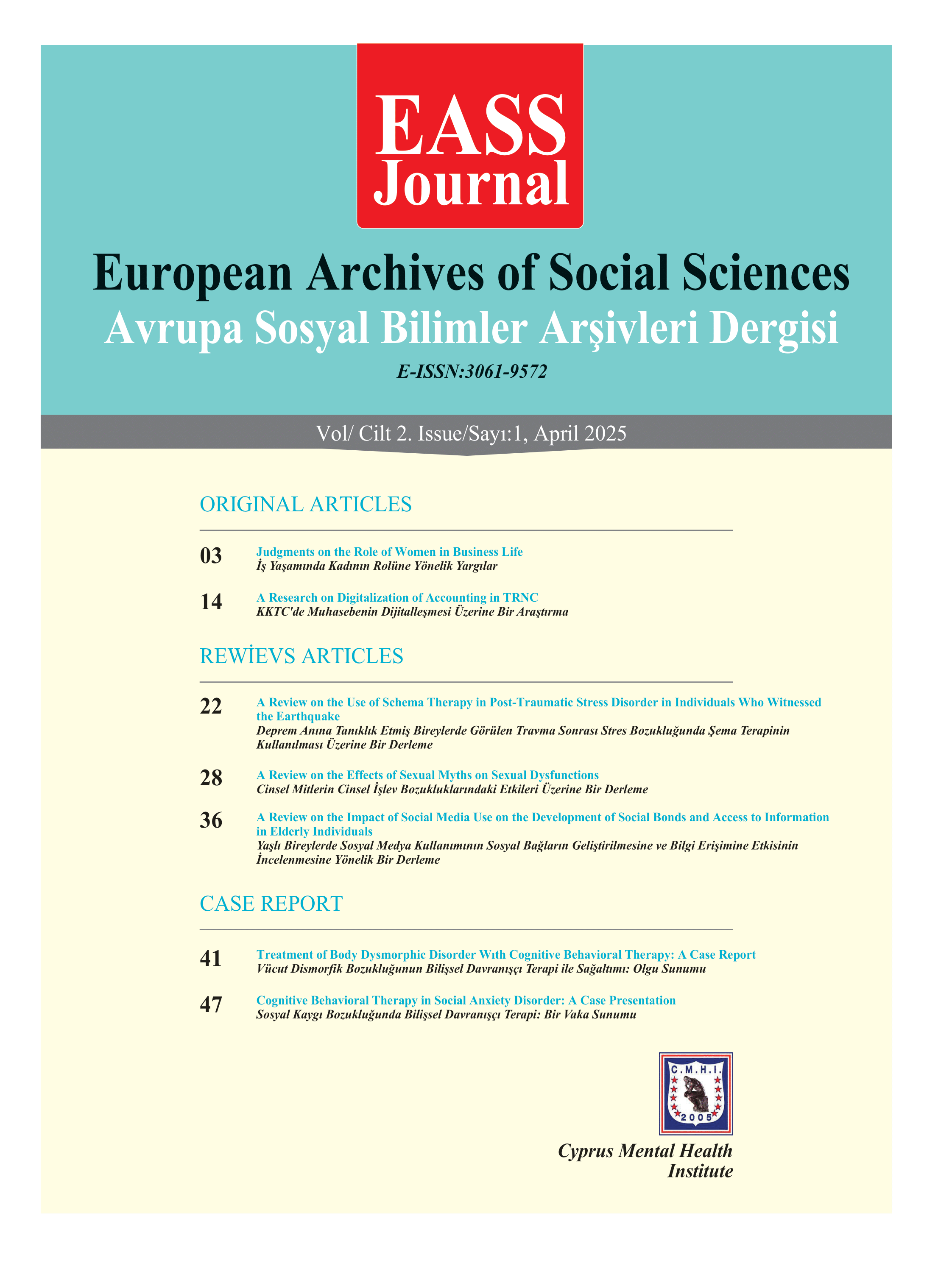Judgments on the Role of Women in Business Life
DOI:
https://doi.org/10.35365/eass.25.2.01Keywords:
Gender, Gender roles, Women, Work lifeAbstract
The aim of this research is to determine the judgments about the role of women in business life according to demographic variables. This quantitative research was conducted using a correlational survey model and represents a population that includes individuals working in the private and public sectors in the TRNC. The research is based on a sample of 360 people determined by quota sampling method. A questionnaire was used as a data collection tool and the questionnaire consists of two parts. While the first part was used to determine demographic variables, the questions in the second part were compiled from Sarıoğlu, (2012) thesis. According to the main findings of the study, certain scores were obtained in the scales reflecting the participants' general perception of women and the standard deviation values in these scales showed that the judgments of the participants were variable. No significant difference was found in the analyses based on gender, marital status and age, but significant differences were found based on educational level, especially in the sub-dimension "Judgments on the Role of Women" and in the overall scale. It was observed that participants with bachelor's degree had different judgments than participants with high school education. In this context, it may be recommended to develop policies and practices that focus on training programs and long-term work experience, gender equality and awareness-raising activities on gender perceptions and gender equality to reduce negative stereotypes about women's place in business life.
References
Akkaş, İ. (2020). Toplumsal cinsiyet algısı üzerine bir değerlendirme: Erzincan Örneği, Dünya Multidisipliner Araştırmalar Dergisi, 1, 55-72.
Arat, T. ve Bakan, Ö. (2011). Uzaktan eğitim ve uygulamaları. Selçuk Üniversitesi Sosyal Bilimler Meslek Yüksekokulu Dergisi, 14(1-2), 363-374.
Ardasheva, Y., Carbonneau, K. J., Roo, A. K., & Wang, Z. (2018). Relationships among prior learning, anxiety, self-efficacy, and science vocabulary learning of middle school students with varied English language proficiency. Learning and Individual Differences, 61(1), 21–30
Bozkurt, A. (2017). Türkiye’de uzaktan eğitimin dünü, bugünü ve yarını. AUAd, 3(2), 85-124.
Çaparlar, C. Ö., & Dönmez, A. (2016). Bilimsel araştırma nedir, nasıl yapılır. Turk J Anaesthesiol Reanim, 44(4), 212-218.
Dimopoulou, E. (2016). Self-efficacy and collectıve efficacy belıefs of teachers of pupıls wıth autısm ın the UK, Phd Thesis, College of Business, Arts and Social Sciences Department of Education Brunel University.
Dvivedi, S., Kaur, N., Dwivedi, S., & Mishra, A. (2022). Internshıp durıng covıd 19 pandemıc: Experıences of stakeholders of teacher traınıng ınstıtutıons. Xi'an Shiyou Daxue Xuebao (Ziran Kexue Ban), Journal of Xi'an Shiyou University, 65 (7), 79-99.
Göktaş, Ö. (2020). Çocuk oyuncaklarındaki toplumsal cinsiyet olgusu, Medya ve Kültürel Çalışmalar Dergisi, 2(1), 29-34.
Downloads
Published
How to Cite
Issue
Section
License
Copyright (c) 2025 emine aksoy, Azmiye Yınal

This work is licensed under a Creative Commons Attribution 4.0 International License.









 The journal is licensed under a
The journal is licensed under a 